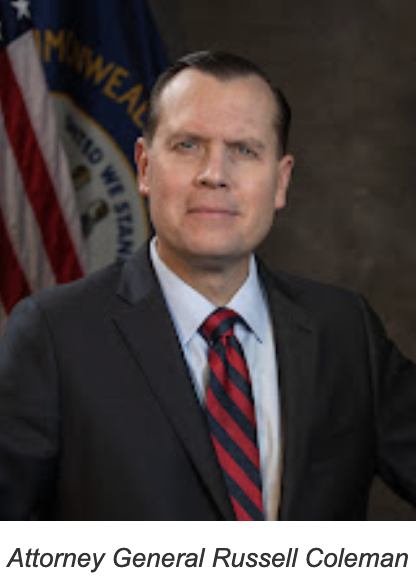Coleman reappoints two members to state opioid commission

Kentucky Health News
Attorney General Russell Coleman has reappointed two members to the state opioid commission, thus not changing the balance of votes on the issue of syringe-exchange programs, which he says he opposes.
Those members are Jason Roop, an assistant professor of business and theology at Campbellsville University, who represents victims of the opioid crisis, and Van Ingram, who works for Gov. Andy Beshear as executive director of the Kentucky Office of Drug Control Policy and fills a slot representing the drug treatment and prevention community. Each of their terms expires in 2026.
The Kentucky Opioid Abatement Advisory Commission has nine voting and two non-voting members. The legislature created the commission in 2021 to distribute the state’s portion of the $900 million in settlements with opioid manufacturers and distributors, with half of the money going to the state and the other half going to local governments.
The money is provided in installments and so far, the state has awarded 110 grants worth more than $55 million for treatment, prevention and recovery.
Coleman’s opposition to syringe exchanges was revealed when Chris Evans, the commission’s executive director and a Coleman employee, passed on a vote approving a grant for the Boyle County Agency for Substance Abuse Prevention because it included help for a syringe exchange.
In passing, Evans said Coleman doesn’t support the exchanges. Coleman, a Republican who was elected in November, later said that was especially the case for programs that are not limited to one-for-one exchanges. His spokesman said Coleman would not base commission appointments on the issue.
As of February, 41 Kentucky counties had syringe-exchange programs that operate under a one-to-one rule and 24 counties have needs-based exchanges, according to the state Department for Public Health. It estimates that the overall return rate of syringes is 85% to 90%.
Syringe exchanges are supported by research. The Centers for Disease Control and Prevention says injection drug users who have access to exchanges are five times more likely to get treatment than those who don’t. Another study says the exchanges do not encourage drug use or increase the frequency of drug use among current users.
Exchanges were authorized by the state’s 2015 anti-heroin law, in an effort to thwart the spread of HIV and hepatitis C, which are commonly spread by the sharing of needles among intravenous drug users.
They also work to reduce overdose deaths by distributing naloxone; reduce medical harms such as skin, blood stream, and heart valve infections that severely injure substance users and incur large health care costs for society; and connect substance users to treatment and recovery supports in order to achieve sustained abstinence.
Patricia Freeman, a University of Kentucky pharmacy professor, has also been reappointed to the commission – by UK as a representative of the HEALing Communities study team, which is working on reducing drug-overdose deaths. Her term will expire in 2026.
Two new non-voting members have also been appointed. State Rep. Chris Fugate, R-Chavies (Perry County), was appointed by House Speaker David Osborne to replace retiring Rep. Danny Bentley, R-Russell. Karen Kelly, chief of staff to U.S. Rep. Hal Rogers, R-5th District, was appointed by Senate President Robert Stivers to replace Carlos Cameron.
Other members of the commission are Republican state Treasurer Mark Metcalf, who also passed on the Boyle County vote; Cabinet for Health and Family Services Secretary Eric Friedlander, who works for Beshear; Von Purdy, a vice president of Simmons College in Louisville, representing citizens at large; Darren “Foot” Allen, a retired state trooper, representing law enforcement; and Karen Butcher, representing citizens at large.